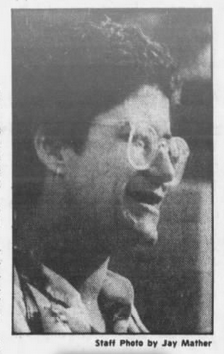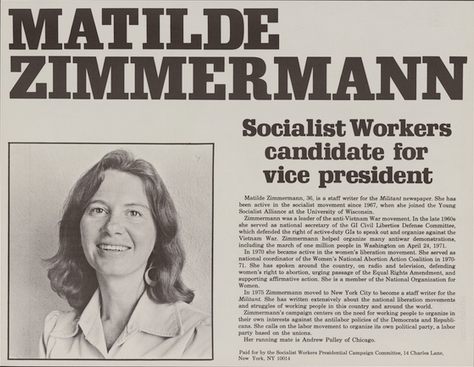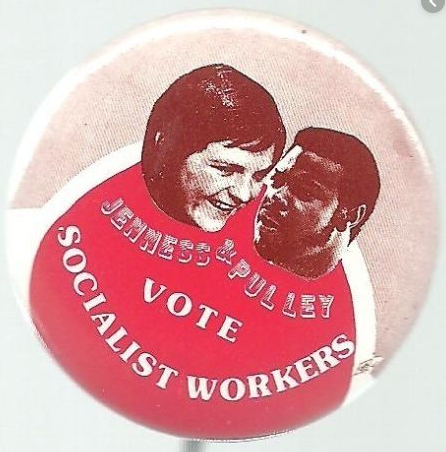Showing posts with label Socialist Workers Party. Show all posts
Showing posts with label Socialist Workers Party. Show all posts
Saturday, February 1, 2020
Andrea González
Andrea González, ca1951 (New York, NY) -
VP candidate for Socialist Workers Party (1984)
Running mate with nominee: Melvin T. Mason (b. 1943)
Popular vote: 0 (0.00%)
Electoral vote: 0/538
The campaign:
In 1984 the SWP nominated Melvin T. Mason for president, and in their perpetual act of Constitutional civil disobedience, nominated Andrea González of Jersey City, age 33 on Election Day, as the VP. Matilde Zimmermann (1980 SWP running mate) was selected as the stand-in VP and she was on the ballot in 23 states and DC with Mason. As far as I can ascertain, although González was the official nominee and campaigned hard as if she was, her name did not appear on a single ballot.
In the time period between the 1980-1984 elections the SWP had experienced a major upheaval in leadership and direction. In general terms it was no longer a party advocating Trotsky's permanent revolution. Now it could be more accurately described as a Castroist party. In-house critics, later purged or self-exiled from the Party, accused the SWP of returning to a Stalinist philosophy and embracing personality-driven regimes. Some of them went so far as to label the SWP a cult.
Mason, a former member of the Black Panther Party, told a reporter: "The greatest example of a Socialist government is Cuba, and Nicaragua is right behind, but it's still developing." Zimmermann seemed to have had a low profile in this campaign if news accounts are any reflection, which granted is not an entirely accurate indicator.
The massive loss of SWP membership was reflected in the rapidly diminishing popular vote compared to previous elections. As low as the 1984 returns were, the SWP would never again (as of 2016) equal it.
Election history:
1981 - District of Columbia School Board (Nonpartisan) - defeated
1985 - Mayor of New York City (Socialist Workers Party) - defeated
1991 - St. Louis, Mo. School Board (Nonpartisan) - defeated
Other occupations: transit employee, steel mill worker, aerospace worker
Notes:
Sometimes called Andrea Gonzales
Opponents in 1985 race included Edward Koch (winner), Lenora Fulani, and Jarvis Tyner
Of Puerto Rican heritage
Saturday, December 28, 2019
Matilde Zimmermann
Matilde Zimmermann, September 6, 1943 (Washington, DC) -
VP candidate for Socialist Workers Party (aka Independent) (1980, 1984)
Running mate with nominee (1980): Cleve Andrew Pulley (b. 1951)
Running mate with nominee (1980): Richard Congress (b. 1943)
Running mate with nominee (1980): Clifton DeBerry (1923-2006)
Running mate with nominee (1984): Melvin T. Mason (b. 1943)
Popular vote (1980 Pulley): 6,264 (0.01%)
Popular vote (1980 Congress): 4,029 (0.00%)
Popular vote (1980 DeBerry): 38,738 (0.04%)
Popular vote (1984): 24,699 (0.03%)
Electoral vote (1980, 1984): 0/538
The campaign (1980):
In 1980 Socialist Workers Party VP nominee Matilde Zimmermann found herself running with three different Presidential candidates, which I believe was a first in US history. The official standard bearer was Andrew Pulley, who had formerly been the SWP VP nominee in 1972. He had a problem with the Constitution since he was still under the age of 35 and many states would not place him on the ballot. On the Washington State Voters Pamphlet the SWP protested, "Pulley does not appear on the ballot due to the reactionary age requirement for President in the Constitution." The Pulley/Zimmermann ticket did show up as an option in six states, however.
In Ohio only, Pulley was substituted by Richard H. Congress. PNW Trivia Alert: He had actually run for Congress in 1970 as the SWP candidate right here in Washington State! I would have loved to have seen (if they existed) his "Congress for Congress" yard signs, but I lived in a different district.
Clifton DeBerry, the SWP 1964 Presidential candidate had been the stand-in during Pulley's 1972 VP run and now he was the stand-in for Pulley's Presidential run. This would be DeBerry's final appearance on any ballot. The DeBerry/Zimmermann ticket was offered as an official choice in 21 states.
Zimmermann was occasionally covered by the media as she urged the US to pull out of Korea, establish foreign relations with Cuba, shut down nuclear power plants, end draft registration, establish national health insurance, and support the Equal Rights Amendment.
She summed up major the party nominees: "As a candidate, Carter promised to stand up for the working man. He was to cut military spending. He has done just the opposite. But I don't think the other candidates are different from Carter. They're all for maintaining the status quo, in which the rich get richer and the poor get poorer. Carter is balancing the budget on the backs of working people. He wants to take money from the needy and give it to the greedy. But our party speaks for working people, while the Democrats and Republicans speak for the oil, automobile and nuclear power industries."
Having peaked in Presidential popular votes in 1976, the SWP numbers begin their decline in 1980. The DeBerry/Zimmermann team's strongest showings were in Pennsylvania 0.44%, Massachusetts 0.15%, Virginia 0.11%, and Alabama and District of Columbia 0.10% each. Pulley/Zimmermann's strongest finish by far was in Mississippi 0.26%. Congress/Zimmermann received 0.09% of the Ohio vote.
The campaign (1984):
In 1984 the SWP nominated Melvin T. Mason for president, and in their perpetual act of Constitutional civil disobedience, nominated Andrea González, age 33 on Election Day, as the VP. Zimmermann was selected as the stand-in VP and she was on the ballot in 23 states and DC with Mason.
In the time period between the 1980-1984 elections the SWP had experienced a major upheaval in leadership and direction. In general terms it was no longer a party advocating Trotsky's permanent revolution. Now it could be more accurately described as a Castroist party. In-house critics, later purged or self-exiled from the Party, accused the SWP of returning to a Stalinist philosophy and embracing personality-driven regimes. Some of them went so far as to label the SWP a cult.
Mason, a former member of the Black Panther Party, told a reporter: "The greatest example of a Socialist government is Cuba, and Nicaragua is right behind, but it's still developing." Zimmermann seemed to have had a lower profile in this campaign if news accounts are any reflection, which granted is not an entirely accurate indicator.
The massive loss of SWP membership was reflected in the rapidly diminishing popular vote compared to previous elections. As low as the 1984 returns were, the SWP would never again (as of 2016) equal it.
The Mason/Zimmermann ticket's highest percentages were in Kentucky 0.23%, Nebraska 0.16%, Minnesota 0.15%, Mississippi and South Dakota 0.11% each, and Ohio 0.10%.
Election history:
1986 - Governor of California (Independent) - defeated
Other occupations: writer for the Militant, author, professor, National Secretary of the GI Civil Liberties Defense Committee
Notes:
Was a write-in the 1986 election.
Spent some of her childhood in the Philippines.
Joined SWP ca. 1968.
Bernie Sanders was an SWP Elector in 1980 (the SWP ticket recieved 75 write-in votes in Vermont)
and supported the Presidential ticket in 1984. I was driving a taxicab in Burlington in 1979 and who
knows, I could've driven Bernie to a SWP meeting.
Some sources, including ballots, list her as Matilde Zimmerman.
Saturday, December 14, 2019
Willie Mae Reid
Willie Mae Reid, March 27, 1939 (Memphis, Tenn.?) -
VP candidate for Socialist Workers Party (aka Independent) (1976, 1992)
Running mate with nominee (1976): Peter Miguel Camejo Guanche (1939-2008)
Running mate with nominee (1992): James Warren (b ca1952)
Popular vote (1976): 90,986 (0.11%)
Popular vote (1992): 2789 (0.00%)
Electoral vote (1976 and 1992): 0/538
The campaign (1976):
The 1976 Socialist Workers Party ticket named Peter Camejo for President and Willie Mae Reid for VP. Camejo had a special focus and experience in tapping into student unrest on college campuses and Reid was an activist in Chicago for African American and women's civil rights. Both of them reminded progressive voters that just because the Vietnam War had ended and Nixon had resigned there remained a multitude of social and economic problems to solve.
Reid spent time campaigning in Australia and New Zealand, connecting with allied political movements.
The student political activity that had helped several Leftist third parties enjoy a spike in popular votes in the 1960s and early 1970s was already cresting. Those that remained in the battlefield seemed to be growing smaller in number but also more militant, which in turn created more divisions within the Party. Camejo himself was expelled from the SWP by the next Presidential election. There is a considerable body of literature attempting to understand and define the subsequent decline of the SWP with descriptions of inner-Party authoritarianism being a common thread.
1976 remains as the year of the highest number of popular votes ever garnered by the SWP in a Presidential election. On the ballot in 27 states and Washington, DC they placed 7th nationally and outpolled all of the other traditional Leftist third parties. Their best showings were in Virginia 1.05%, New Mexico 0.59%, Mississippi 0.36%, District of Columbia and Massachusetts both 0.32%, and Indiana 0.26%.
Both Camejo and Reid would reappear on Presidential tickets.
The campaign (1992)
James "Mac" Warren, the SWP's 1992 Presidential candidate had a few things in common with Willie Mae Reid including that he was a Chicago-based African American who had run against a member of the Daley family for Mayor. Also, Warren and Reid had previously been on Presidential tickets. Warren was the SWP nominee in 1988.
Warren's running mate in the now much more depleted SWP was Estelle DeBates, a staff writer for The Militant, a SWP organ. DeBates was 32 years old, younger than the minimum age mandated by the Constitution for Vice-President. On this basis there were some states that would not allow her name on the ballot, so Willie Mae Reid was chosen to act as a stand-in VP in those jurisdictions. By 1992 Reid was living in Houston, Tex., possibly having moved there as part of the SWP's 1980s activist relocation program-- not unlike missionary work.
Reid was the official running mate in Illinois, Iowa, New Mexico, Tennessee (her native state), Utah, and Wisconsin. She was considered the write-in SWP VP in Delaware and Ohio. The Warren/Reid team finished strongest in Utah with 0.04%. Warren's total popular vote with both running mates was 23,612 (0.02%).
Other occupations: author, garment worker, office worker, computer programmer, hospital kitchen worker
Election history:
1974 - US House of Representatives (Ill.) (Socialist Workers Party) - defeated
1975 - Mayor of Chicago, Ill. (Socialist Workers Party) - defeated
1985 - Mayor of Houston, Tex. (Nonpartisan) - defeated
1990 - US House of Representatives (Tex.) (Independent) - defeated
1991 - Mayor of Houston, Tex. (Nonpartisan) - defeated
1996 - US House of Representatives (Mich.) (Independent) - defeated
Notes:
Opponents in the 1975 race included Richard Daley (winner) and write-in J. Quinn Brisben. Daley
had been the running mate with Pigasus in the Youth International Party in 1968 and Brisben would
be the Socialist Party USA VP in 1976, so the 1975 Chicago Mayoral election had three third party
vice-presidential candidates in competition. Pretty groovy, eh?
Winner of the 1996 race was John Conyers.
Joined the SWP in 1971.
Some sources give her year of birth as 1937.
Moved to Chicago in 1960.
Monday, November 4, 2019
Clifton DeBerry
DeBerry in upper left, NYC Mayor candidate debate 1965
Clifton DeBerry, September 18, 1923 (Holly Springs, Miss.) - March 24, 2006 (Union City, Calif.)
VP candidate for Socialist Workers Party (1972)
Running mate with nominee: Evelyn Reed (1905–1979)
Popular vote: 13,878 (0.02%)
Electoral vote: 0/538
The campaign:
Clifton DeBerry's Vice-Presidential run in 1972 is hardly ever included in his resume of campaigns, but the Socialist Workers Party veteran did indeed serve as a running mate in that year. Notice I said "a" running mate rather than "the" running mate. The official SWP VP nominee was Cleve Andrew Pulley, who along with the official SWP Presidential nominee Linda Jenness, was too young to meet the Constitutionally mandated age of 35 to be sworn into office.
In most states this age problem was regarded as academic, but in Indiana, New York, and Wisconsin the Jenness/Pulley ticket was not allowed on the ballot. So in those states the Party substituted Evelyn Reed for President (she had actually met Trotsky in 1940) and Clifton DeBerry.
DeBerry had been the Party's Presidential nominee in 1964. Although there were other African-American nominees for President in the past, DeBerry was the first where his name appeared on a ballot. His role in the 1972 campaign as a substitute VP did not seem to loom large in his roster of accomplishments.
Their showings: Indiana 0.26%, New York 0.11%, Wisconsin 0.03%.
Election history:
1963 - New York City Council (Socialist Workers Party) - defeated
1964 - US President (Socialist Workers Party) - defeated
1965 - New York City Mayor (Socialist Workers Party) - defeated
1970 - Governor of New York (Socialist Workers Party) - defeated
1975 - Berkeley, Calif. City Council (Nonpartisan) - defeated
1980 - US President (Socialist Workers Party) - defeated
Other occupations: house painter, farm equipment factory worker, author
Buried: ?
Notes:
Born in the same town where Absolom Madden West, 1884 VP nominee of the Greenback Party, died
in 1894.
Opponents in 1965 race included John Lindsay (winner), Abraham Beame, William F. Buckley, and
Eric Hass
Opponents in 1970 race included Nelson Rockefeller (winner), Arthur Goldberg, and Stephen Emery
Left the Communist Party USA and joined the SWP in 1953
Moved to New York from Chicago in 1960
Ceased being politically active in the 1990s but remained loyal to SWP.
Cleve Andrew Pulley
Cleve Andrew Pulley, May 5, 1951 (Greenwood, Miss.) -
VP candidate for Socialist Workers Party (aka Independent) (1972)
Running mate with nominee: Linda Jenness (b. 1941)
Popular vote: 69,502 (0.09%)
Electoral vote: 0/538
The campaign:
The Socialist Workers Party 1972 ticket featured two people, Linda Jenness and Andrew Pulley, who were below the minimum age mandated by the Constitution.
Their issues included: Out of Vietnam, 30-hour work week, abolition of taxes on incomes under $10,000 and 100% taxation of incomes above $25,000, free health care, free mass transportation, prison reform, community control for African-American and Latino populations, women's rights, and gay rights.
This election and perhaps the next in 1976 could be considered the era when the SWP enjoyed the peak of it's growth and influence. The years ahead would be filled with serious infighting, splinters, and decline as the Left redefined itself after the Vietnam War and Richard Nixon were no longer around to be concentrated on as focal points that had formerly acted as something of a unifier for the Progressive side. The youth wave crested in politics. Rock surrendered to Disco.
The ages of the candidates proved to be a problem in terms of ballot access for Indiana, New York, and Wisconsin. In those three states the SWP ticket consisted of the older Evelyn Reed and Clifton DeBerry.
Jenness/Pulley were on the ballot in 18 states and the District of Columbia. In two additional states, Arizona and Louisiana they were included by default since only the Electors were listed. They finished with an astounding 69,502 votes, and with the Reed/DeBerry results added the SWP polled a total of 83,380 popular votes. Their strongest states were Arizona 4.74% and Louisiana 1.37%-- the only two states where their names were not actually listed! In Arizona they earned an amazing 30,945 votes.
Or did they?
Turns out Arizona had experienced some ballot irregularities. A huge malfunction in mostly Pima County but also in Yavapai County apparently awarded SWP with over 30,000 votes they most certainly did not receive in real life. So their national total was probably more in the neighborhood of 52,000 votes, which is still a relatively strong showing in the history of this party.
Election history:
1970 - US House of Representatives (Calif.) (Socialist Workers Party) - defeated
1976 - US House of Representatives (Ill.) (Socialist Workers Party) - defeated
1979 - Mayor of Chicago, Ill. (Socialist Workers Party) - defeated
1980 - US President (Socialist Workers Party) - defeated
1984 - US House of Representatives (Mich.) (Socialist Workers Party) - defeated
1986 - US House of Representatives (Mich.) (Socialist Workers Party) - defeated
1990 - US House of Representatives (Mich.) (Socialist Workers Party) - defeated
1992 - US Senate (Iowa) (Socialist Workers Party) - defeated
Other occupations: soldier (Vietnam War), steel mill worker, railroad switchman, taxicab driver, SWP Presidential Elector (Iowa) 2012,
Notes:
Moved to Cleveland, Ohio in 1963.
Winner of the 1970 race was Ron Dellums. Pulley was a write-in and under the age of 21, which at
the time was the minimum voting age.
Winner of the 1979 race was Jane Byrne
Winner of the 1984 and 1986 races was John Conyers
Winner of the 1992 race was Chuck Grassley
Still involved with SWP into Century 21.
Subscribe to:
Posts (Atom)



















































